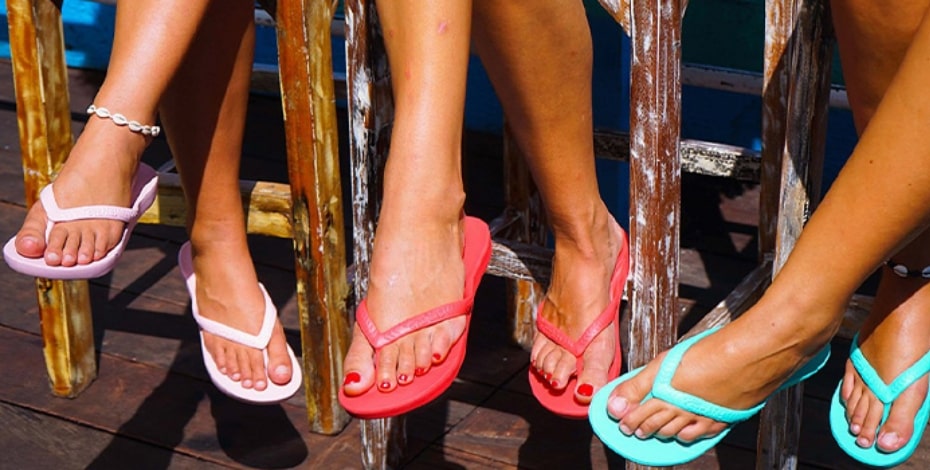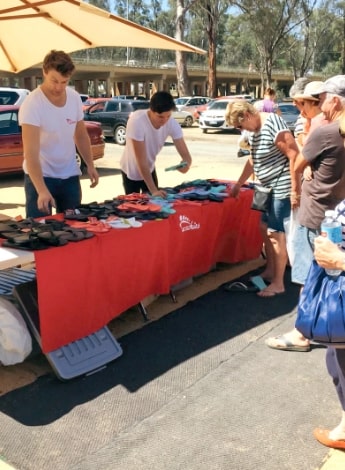
Design and dedication

Physiotherapists are adept at using their skills beyond the clinical setting. To succeed in business, all it takes is one idea—an insight gleaned from practice that genuinely fills a gap in the market. Antony Hirst conducts a Q&A with Daniel Jones.
While working in private practice, Daniel Jones found that he was constantly treating ailments caused by wearing flat-
soled thongs.
In a light bulb moment, he set out to develop a thong with orthotic support, creating the first prototypes in his grandparents’ shed.
A few design innovations later, Archies footwear was born.
You’ve clearly gone down a different path from the average physiotherapist—what led you to product development?
I think that at the time, while I did not like to admit it, deep down I was not enjoying what I was doing and I was looking for a way out.
While working as a physio, I had tried several other ventures but decided not to proceed with them.
Fortunately, when the opportunity for Archies came along, I was ‘tuned in’ enough to recognise it and had the dedication and energy to pursue it.
Did you anticipate the tremendous success you have had so far?
Archies is going well and to be honest, its success hasn’t surprised me.
I’ve always been incredibly confident about the idea and I knew it would fill a significant gap in the market.
Without that belief, I would never have been able to get past all the hurdles and bumps that I’ve encountered along the way.
However, while the success has not been a surprise, I never imagined just how hard it would be.
I thought that with such an amazing product, everything would be easy.
Coming up with the idea is the easy part; seeing it through all the challenges is much harder.
I never could have anticipated that starting a product-based business would be as hard as it is.
Do you miss the clinical side of treating patients?
No, I don’t. There was a point fairly early in my career when I realised that physio was not the right job for me.

Daniel Jones.
This was hard to admit because it was always my dream to become a physio and I’d spent four hard years studying to get there.
Different jobs suit different people and this type of job just did not suit me. I’m much happier working in business.
Do you think more physiotherapists should use their knowledge and education in ventures other than traditional clinical practice?
It all depends on the individual. If you love doing what you do and it fulfils you, then why change that?
The only reason I started looking for other opportunities was because I wasn’t happy; I wasn’t passionate about what I was doing.
Life is short—if you aren’t enjoying your current work, then I think you should strive to find the thing that excites you, whether that’s still in the field of physiotherapy or in a non-related field.
Do you consider yourself to be a physiotherapist first and an entrepreneur second or do you think you always had an entrepreneurial streak?
I’ve never considered myself to be an entrepreneur. I remember hearing the word when I was younger but I just thought it was a term for some multimillionaire businessperson.
I grew up very modestly in the country and money was not something that was valued or emphasised.
In hindsight, however, I was a natural entrepreneur.
I never had a ‘regular’ job growing up.
While my friends were working part-time jobs, I would go fishing and sell my catch to the fish and chip shop.
I’d go yabbying and ‘bardi grubbing’ and sell them as bait to the local fishing store.

Daniel started by selling his Archies thongs at markets.
I used to hunt golf balls at the golf course and sell them to Dad’s friends. These were all things that I loved doing so it never felt like work.
Archies is like that for me now. As for the physio part, I’m proud to have been a physio but that was something I did in the past.
So I don’t think of myself as either an entrepreneur or a physio, just as someone who does something I love—and that happens to be business.
Have you gone back and done any business-related training to complement your current role?
No and realistically I do not have the time to do so.
I’m sure it would be helpful to some extent, but there are a handful of brilliant books that summarise the basics of business and the rest is just common sense—doing the basics well and trying to make good decisions on a daily basis.
Where do you see Archies in five to 10 years’ time and do you have the drive to continue to do it?
Who knows what the future will bring?
I hope that within 10 years I will have cashed in on some of the hard slog and won’t be working as much.
I’d still like to be involved in Archies because it’s my baby, but working in a reduced capacity would be nice. It would be very hard to maintain the level of intensity that I applied to the business in those first years.
Were there times in the early days when you thought you might have made the wrong decision?
I don’t think I ever contemplated the idea that I might have made the wrong decision.
I did frequently wonder how the business was going to survive because there were some seriously tough times financially.
Even now, when I see mates who get a pay cheque rain, hail or shine and who can leave their work at the office, I sometimes think ‘Wouldn’t that be nice?’
When you own a business, it can be very hard to escape it.
However, while running your own business can be stressful, I’m very grateful for what I have.
What’s the best piece of business advice you’ve ever been given and who gave it to you?
The best specific advice I got—which was actually given by you— was to get your money up-front.
Otherwise, you just spend time and money trying to chase it up.
So our payment terms are up-front prior to shipment.
This has had a dramatic impact on our business and we never would have survived without it.
>> Antony Hirst APAM has been a physiotherapist since 1992 and has always had a keen interest in private practice sustainability. Antony is the current chair of the Victorian branch of the APA Business group and spends his time helping physiotherapy clinics through Antony Hirst Consulting.
© Copyright 2025 by Australian Physiotherapy Association. All rights reserved.





